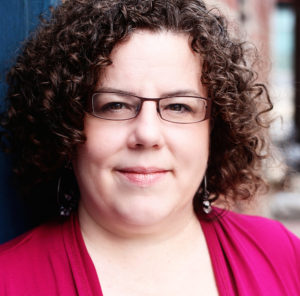Blog
Q&A With Richmond Author, Lana Krumwiede, Teacher of VisArts’ Yearlong Novel Writing Class
The Visual Arts Center of Richmond is giving aspiring novelists the perfect opportunity to kick-start their writing careers in 2020. VisArts’ yearlong novel writing class kicks off again this January. In this special class, writers will have the chance to spend an entire year workshopping their writing with Richmond-based author, Lana Krumwiede. Krumwiede is the author of The Psi Chronicles, a middle-grade science fiction trilogy published by Candlewick Press. Her first novel, Freakling, was followed by two more novels in The Psi Chronicles, Archon (2013) and True Son (2015).
 Q: I watched the video on your website and remember you mentioned that reading was important to you as a kid. Can you expand on how you came to love books as a child?
Q: I watched the video on your website and remember you mentioned that reading was important to you as a kid. Can you expand on how you came to love books as a child?
As a young child, we lived in a very small, rural town. The library was the absolute most exciting place to go! My mother would take my brothers and I every week and we each got to check out a stack of books.
Q: Can you share more about how you fell in love with children’s literature again through reading with your own kids?
Reading with my kids was an important way for us to interact in a way that didn’t involve homework, chores, and many of the other things that parent-child interactions revolve around. We could just talk about the stories we were reading. I have four children, and I would read whatever they were reading so we could talk about it. That amounted to a lot of children’s and young adult books! Like all genres, some are better written than others, and I started paying attention to what made a book memorable versus forgettable. Stories for children are interesting because the story elements are front and center. Kids are not so impressed with literary style or elevated language. As a reader, that appeals to me.
Q: How long have you lived and worked in the Richmond area?
Going on 11 years!
Q: What inspired you to take the plunge and write a novel?
I was perfectly happy writing short stories for magazines and didn’t have grand ambitions. Because I was writing maybe three or four short pieces every month, I was constantly on the lookout for story ideas. I began to see story potential in all kinds of things happening around me. When I caught the scent of a story, I would try to figure out what kind of story would fit the idea best. Then the inevitable moment arrived when I ran across an intriguing idea that I knew would have to be told in a novel in order to do the story justice. I didn’t know how to write a novel, but the idea wouldn’t leave me alone. It became kind of a secret pet project–something I did for my own entertainment or when I was stuck on a different story and needed a creative outlet. The story grew from there until gradually, I stopped writing for magazines and focused on the novel.
Q: Can you share more about the process of writing your first novel?
It was long and messy and frustrating and glorious. The story was teaching me how to write a novel. I probably started over dozens of times. But I was all in, determined to get it right. I was really immersed in the world and often had dreams about my characters. Eventually, it started to feel like they were communicating with me, letting me know when I started to get off track. It was an amazing experience that taught me a lot about myself.
Q: What’s it like juggling motherhood and a career as an author?
It’s certainly not easy. Sometimes we think one interferes with the other, but in many ways they feed and energize each other. I think it’s because both writing and parenting are very creative pursuits.
Q: What advice do you give writers who are just starting out?
Read as much as you can. Write as much as you can. Don’t be overly concerned with perfection. For now, pay attention to your story instincts and see what happens when you follow them.
Q: What can students expect in the yearlong novel writing class that you teach at VisArts?
Be ready for an amazing year-long writing journey, nurturing your writing life, encouraging each other, honing skills, and learning how to be productive and effective as a writer. And in the process, creating a first draft of a novel.
Q: What do you think is the most valuable aspect of working alongside other writers in a class like this?
When we work to create and participate in a supportive community of writers, each individual writer is lifted. When you’re a part of something like that, the growth you’ll experience is phenomenal. There’s nothing else like it!